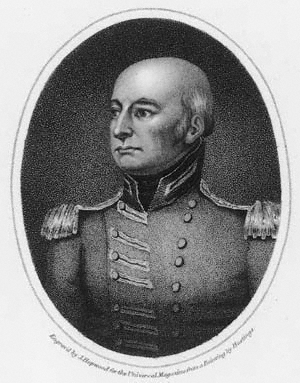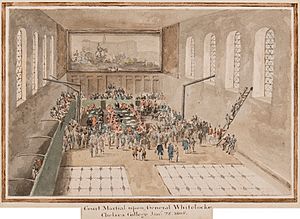John Whitelocke facts for kids
Quick facts for kids
John Whitelocke
|
|
|---|---|

John Whitelocke, Published in 1808
|
|
| Born | 1757 |
| Died | 23 October 1833 Hall Barn Park, Beaconsfield, Buckinghamshire |
| Buried | |
| Allegiance | |
| Service/ |
|
| Years of service | 1778–1808 |
| Rank | Lieutenant General |
| Battles/wars | British invasions of the Río de la Plata |
John Whitelocke (born in 1757 – died on October 23, 1833) was an important officer in the British Army. He is mostly remembered for leading a military mission to Buenos Aires in 1807, which did not go as planned.
Early Military Life
John Whitelocke started his army career in 1778. He went to Marlborough Grammar School and a special military academy in Chelsea. Early in his career, he served in places like Jamaica and San Domingo.
In 1799, he became the Lieutenant-Governor of Portsmouth. This meant he was in charge of the soldiers there. He also commanded the South-West District. This was a time when Britain was worried about being invaded.
By 1804, he had become a Lieutenant General. He also helped with finding new soldiers for the British Army. This was important because the army was growing a lot at that time.
The Buenos Aires Expedition
In 1807, General Whitelocke was chosen to lead a big army mission. Their goal was to capture Buenos Aires from the Spanish Empire. At this time, the Spanish Empire was having problems in Europe.
The British forces attacked Buenos Aires, but the mission failed. The British soldiers suffered many losses. General Whitelocke then had to talk with the opposing general, Santiago de Liniers.
Whitelocke decided that his army could not win. So, he signed an agreement to surrender. He ordered the British forces to leave Montevideo and go back home.
After the Expedition
Many people in the British Army and the public were unhappy with Whitelocke's decision. Because of this, he had to face a special military trial called a court-martial. This trial happened at The Royal Hospital in London in 1808.
The court found him guilty of most of the charges against him. As a result, he was removed from the army. After this, he lived a quiet life. He passed away at Hall Barn Park in Beaconsfield, Buckinghamshire, on October 23, 1833.
See also
 In Spanish: John Whitelocke para niños
In Spanish: John Whitelocke para niños
 | Audre Lorde |
 | John Berry Meachum |
 | Ferdinand Lee Barnett |


